'Vacant Property Safe Passages Ordinance' will force banks to protect people at property after foreclosures... Aldermen propose ordinance forcing banks to protect foreclosure sites that have become a danger near schools
Two Chicago aldermen, Deborah Graham (29) and Robert Fioretti (2), have announced that they will introduce an ordinance in Chicago’s City Council that will require banks that have foreclosed on homes across Chicago to provide maintenance and security on those buildings that are within 1,000 yards of schools. The two aldermen, accompanied by officials of the Chicago Teachers Union and Action Now, a community organizing group, introduced the public and the press to just one of the areas in Chicago that would be affected by the ordinance during a press conference and walkabout in the 5200 block of W. Congress on the afternoon of October 2, 2011.
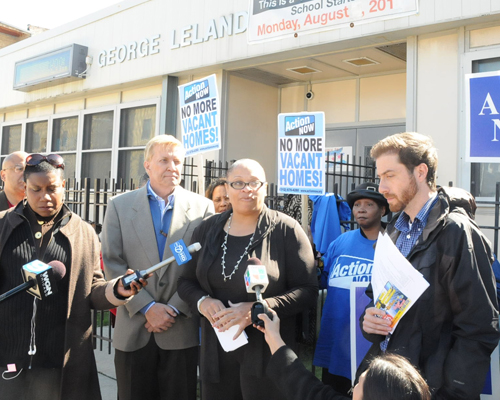 Alderman Deborah Graham (29th Ward) speaks to the press in front of the George Leland Elementary School in the 5200 block of Congress Parkway in Chicago while Alderman Robert Fioretti (2nd Ward), union official,s and members of Action Now look on. Alderman Graham will be introducing an ordinance in the Chicago City Council requiring banks to protect and police properties that they have foreclosed on, if those properties are within 1,000 yards of schools. Substance photo by George N. Schmidt. The walk took people past three buildings within 200 yards of Leland Elementary School that are currently in foreclosure, and heard from neighbors who told the group that until the aldermen and the union announced the press conference, one of the buildings had been used as a drug house and for dog fighting by gang members. That particular building is five doors down from a Chicago elementary school.
Alderman Deborah Graham (29th Ward) speaks to the press in front of the George Leland Elementary School in the 5200 block of Congress Parkway in Chicago while Alderman Robert Fioretti (2nd Ward), union official,s and members of Action Now look on. Alderman Graham will be introducing an ordinance in the Chicago City Council requiring banks to protect and police properties that they have foreclosed on, if those properties are within 1,000 yards of schools. Substance photo by George N. Schmidt. The walk took people past three buildings within 200 yards of Leland Elementary School that are currently in foreclosure, and heard from neighbors who told the group that until the aldermen and the union announced the press conference, one of the buildings had been used as a drug house and for dog fighting by gang members. That particular building is five doors down from a Chicago elementary school.
The most dramatic scene came when the group arrived at the third building, as 5243 W. Congress. The neighbor in the adjacent house said that Bank of America, which owns the foreclosed building, had allowed the building to become a drug house for gang members and a location for dog fights, only cleaning up the site a little when the union and aldermen announced that they would be holding a press conference about the blight on October 2.
Alderman Graham told the press that the ordinance would provide some greater safety to children who have to walk to and from their neighborhood schools on streets where many of these houses are currently located.
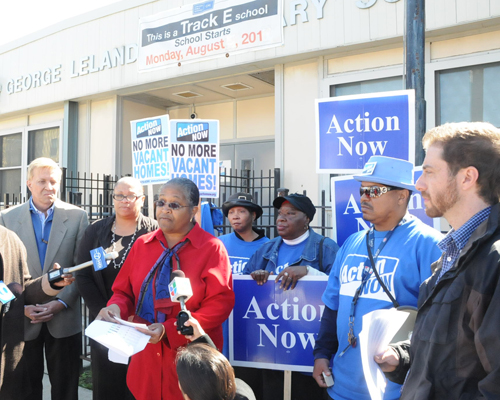 Teacher Bonita Robinson (above in red dress at microphone) told the press that she had regularly visited homes and walked children to and from school during her 40 years' teaching in the Austin community. Robinson said that the problems with vacant buildings caused by foreclosures has been a growing one, and that the children are both fearful and in danger. Above (left) Alderman Robert Fiorett; Alderman Deborah Graham. Far right, Jackson Potter of the Chicago Teachers Union. Substance photo by George N. Schmidt. A news conference was held to announce the Vacant Property Safe Passages Ordinance to be presented to the aldermen at the next City Council meeting. The news conference was held in front of Leland Elementary School, 5231 W. Congress Blvd.
Teacher Bonita Robinson (above in red dress at microphone) told the press that she had regularly visited homes and walked children to and from school during her 40 years' teaching in the Austin community. Robinson said that the problems with vacant buildings caused by foreclosures has been a growing one, and that the children are both fearful and in danger. Above (left) Alderman Robert Fiorett; Alderman Deborah Graham. Far right, Jackson Potter of the Chicago Teachers Union. Substance photo by George N. Schmidt. A news conference was held to announce the Vacant Property Safe Passages Ordinance to be presented to the aldermen at the next City Council meeting. The news conference was held in front of Leland Elementary School, 5231 W. Congress Blvd.
"The ordinance will require banks to be good neighbors and secure their vast numbers of foreclosed properties across Chicago," said Alderman Graham. "It is also designed to protect the community's school children, requiring watchmen in vacant buildings within the vicinity of public schools."
According to the proposed ordinance, an owner must have a watchman on duty upon the premises on which any vacant building within a 1,000 yard radius of a public school is situated between 8:00 a.m. and 4 p.m. Any bank that violates the provisions of this section shall be punished by a fine of not less than $100 nor more than $300 for the first offense and not less than $300 nor more than $500 for the second and each subsequent offense.
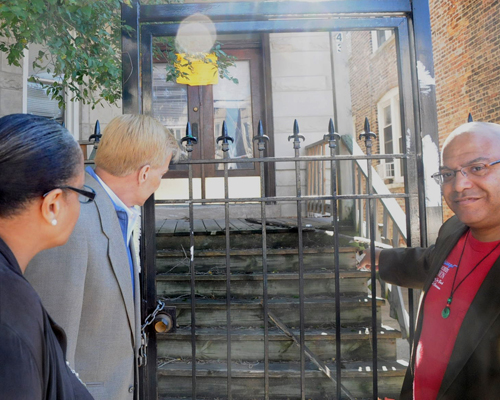 Chicago Teachers Union Recording Secretary Michael Brunson (above right) points to the crumbling staircase at the front of the building at 5243 W. Congress, while aldermen Deborah Graham and Robert Fioretti look on. The 5243 building is less than 500 yards from the main entrance of the Leland Elementary School, and will come under the ordinance when it is passed by the Chicago City Council. The building was foreclosed by Bank of America and has been deteriorating without any Bank of America action for more than one year. According to neighbors, the 5243 building had been used by gang members as a drug house and for dog fights until a couple of days before the arrival of the press conference, which took place on Sunday, October 2, 2011. Substance photo by George N. Schmidt.Alderman Robert Fioretti outlined the increase in foreclosures in Chicago during his press remarks and reminded people of the need to provide safe streets for children going to and from schools.
Chicago Teachers Union Recording Secretary Michael Brunson (above right) points to the crumbling staircase at the front of the building at 5243 W. Congress, while aldermen Deborah Graham and Robert Fioretti look on. The 5243 building is less than 500 yards from the main entrance of the Leland Elementary School, and will come under the ordinance when it is passed by the Chicago City Council. The building was foreclosed by Bank of America and has been deteriorating without any Bank of America action for more than one year. According to neighbors, the 5243 building had been used by gang members as a drug house and for dog fights until a couple of days before the arrival of the press conference, which took place on Sunday, October 2, 2011. Substance photo by George N. Schmidt.Alderman Robert Fioretti outlined the increase in foreclosures in Chicago during his press remarks and reminded people of the need to provide safe streets for children going to and from schools.
A few minutes later, the two aldermen joined by more than 30 others were staring down a driveway into an open garage behind one of the foreclosed buildings (5243 Leland) on the block near Leland school. Neighbors described how that home had been taken over by gangs for drugs and dog fighting until a few days earlier, when suddenly the site was cleaned up, apparently because the press was expected.
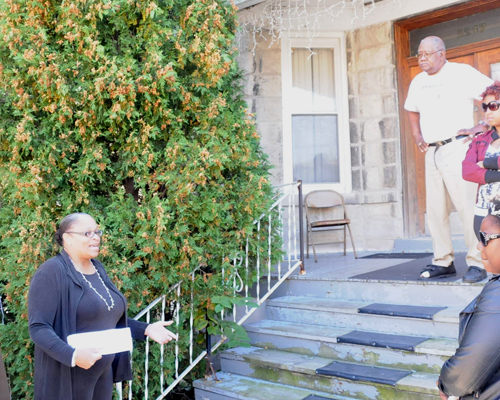 Alderman Deborah Graham (above left) speaks with Sherman Carter, owner of the building at 5247 W, Congress. Carter told the aldermen and the press that the Bank of America foreclosed building at 5243 W. Congress to the east of their property (which is located at 5247) had been vacant and used by gangs and created noise and odor nuisances until a recent quickie clean-up. He suggested that the clean up was apparently promoted by the announcement that the press conference was about to be held. Substance photo by George N. Schmidt.Representing the Chicago Teachers Union was Jackson Potter. “We are working together with Graham to address the tremendous foreclosure crisis currently wreaking havoc on families across the city,” said Potter, CTU staff coordinator, in a prepared statement. “In 2010 alone there were 10,500 foreclosures completed in Chicago, an increase of 20 percent from the year before. This has resulted in a serious public safety issue for our children around our schools. We want to protect our students.” In addition to Jackson Potter, CTU organizers and Michael Brunson, the union's recording secretary, were present for the event.
Alderman Deborah Graham (above left) speaks with Sherman Carter, owner of the building at 5247 W, Congress. Carter told the aldermen and the press that the Bank of America foreclosed building at 5243 W. Congress to the east of their property (which is located at 5247) had been vacant and used by gangs and created noise and odor nuisances until a recent quickie clean-up. He suggested that the clean up was apparently promoted by the announcement that the press conference was about to be held. Substance photo by George N. Schmidt.Representing the Chicago Teachers Union was Jackson Potter. “We are working together with Graham to address the tremendous foreclosure crisis currently wreaking havoc on families across the city,” said Potter, CTU staff coordinator, in a prepared statement. “In 2010 alone there were 10,500 foreclosures completed in Chicago, an increase of 20 percent from the year before. This has resulted in a serious public safety issue for our children around our schools. We want to protect our students.” In addition to Jackson Potter, CTU organizers and Michael Brunson, the union's recording secretary, were present for the event.
"The CTU ordinance calls on banks to protect its school children, requiring watchmen in vacant buildings within the vicinity of public schools," said a CTU press statement distributed before the event. " An owner must have a watchman on duty upon the premises on which any vacant building within a 1,000 yard radius of a public school is situated between 8:00 a.m. and 4 p.m.
Any bank that violates the provisions of this section shall be punished by a fine of not less than $100 nor more than $300 for the first offense and not less than $300 nor more than $500 for the second and each subsequent offense." Neighbors who came to their porches to share stories told of the blight on the community that had been created when banks foreclosed on the properties and then allowed them to be utilized by gangs for drug house and dog fights.
The major banks are all responsible for the scandalous conditions that were documented by the people sponsoring the ordinance, but Bank of America (which owns the drug house and dog-fighting site on Congress uncovered during the October 2 walkabout) seems particularly gross in their racist treatment of people in Chicago's African American community (the area of the October 2 event is all-black).
Then, to add insult to injury according to some of the people there from Action Now, Bank of America announced the same weekend that it will be charging a $5 monthly fee for those using BOA Visa debit cards. Bank of America earlier this year claimed that changes in debit card rules to cost the company about $2 billion a year. Recently, the bank said the debit-card changes required by the new government rules will cut revenue by about $475 million in the fourth quarter this year.
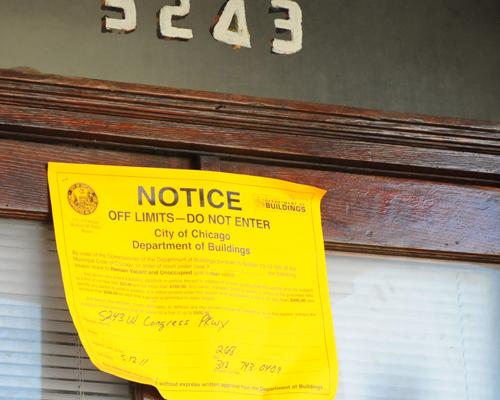 A City of Chicago notice posted on the door of the building at 5243 W. Congress did nothing to prevent gangs from using the foreclosed building, now owned by Bank of America, from being used as a drug house and for gangs' dog fights, according to neighbors. Substance photo by George N. Schmidt.[History: President Obama signed the Credit CARD Act of 2009 into law on May 22, 2009, following passage days earlier in the Senate and the House. Credit card issuers and credit industry experts warned both President Obama and the U.S. Congress that the Credit CARD Act of 2009 would make credit cards more costly for all users and inaccessible for many low-income families and people with less than perfect credit. ]
A City of Chicago notice posted on the door of the building at 5243 W. Congress did nothing to prevent gangs from using the foreclosed building, now owned by Bank of America, from being used as a drug house and for gangs' dog fights, according to neighbors. Substance photo by George N. Schmidt.[History: President Obama signed the Credit CARD Act of 2009 into law on May 22, 2009, following passage days earlier in the Senate and the House. Credit card issuers and credit industry experts warned both President Obama and the U.S. Congress that the Credit CARD Act of 2009 would make credit cards more costly for all users and inaccessible for many low-income families and people with less than perfect credit. ]
CORPORATE MEDIA COVERAGE OF THE EVENT WAS ACCURATE...
Coverage of the press conference and walkabout in Chicago's two daily newspapers was surprisingly accurate and fair, as a reading in the October 3 editions of the Sun-Times and Tribune showed. Neither newspapers sent their regular education beat reporters to cover the Sunday afternoon story (which took place during the Bears game).
SUN TIMES STORY FOLLOWS HERE:
Proposal requires property owners to secure vacant buildings near schools
By Mary Houlihan Staff Reporter mhoulihan@suntimes.com October 2, 2011 7:34PM
Updated: October 3, 2011 2:08AM Members of the Chicago Teachers Union, city aldermen and public safety advocates gathered Sunday to announce a plan to help keep Chicago Public School children safe.
At a news conference in front of Leland Elementary School, 5231 W. Congress, Ald. Deborah Graham (29th) said she will introduce on Wednesday the Vacant Property Safe Passages ordinance.
Backed by the Chicago Teachers Union, the ordinance requires owners of vacant buildings within a 1,000-yard radius of public schools to have a watchman on the premises between 8 a.m. and 4 p.m. Non-compliance will result in fines of up to $500.
“This is an important piece of legislation,” Graham said. “We want these properties secured on a daily basis to ensure the safety of schoolchildren.”
Ald. Robert Fioretti (2nd) agreed, simply stating, “This ordinance protects our children.”
Jackson Potter, CTU staff coordinator, pointed out that many elementary schools, including Talcott, Marquette, West Pullman and Barton, have many vacant buildings in close proximity.
“This is a real crisis,” Potter said. “It’s not something we’re making up.”
Providing safe passage remains a top priority at Chicago Public Schools, says spokeswoman Becky Carroll.
“Despite the historic $700 million budget deficit CPS faced this year, we increased funding for our Safe Passage program to expand the number of schools and community watchers on the street,” Carroll said. “They provide a safe passage for students residing in communities with the highest incidents of crime involving gang activity and other violent incidents.”
While no incidents have been reported in regard to the vacant buildings, they remain a threat to children, says Michelle Young, president of Act Now, a family advocacy organization.
“We don’t want to wait for something to happen,” Young said. “We want to keep it from happening.”
To drive the point home, advocates pointed out three vacant graystones on the same block as Leland Elementary. Sherman Carter, a 41-year resident of the neighborhood, lives next to one that has been empty for three years. He says the yard was finally cleaned up this past week.
“Word must have gotten out about the press conference,” Carter said, shaking his head. “This house has been really, really bad and full of trouble. The need is great to take care of these buildings for the safety of the schools and the neighborhoods.”
CHICAGO TRIBUNE COVERAGE ON LINE AND IN PRINT OCTOBER 3, 2011 BELOW HERE:
Ordinance aims to hold owners accountable for illegal activity at vacant properties and create safe passage for schoolchildren. By Dan Hinkel, Tribune reporter. 9:59 p.m. CDT, October 2, 2011
Two of the first five houses immediately west of George Leland Elementary School are vacant, and the boarded-up home next to Sherman Carter's has long served as a haven for dogfighters and drug dealers, he said.
Carter, 68, said this brick two-story home in the Austin neighborhood — its wooden porch sagging, its front gates held together by a chain — is more than just a "filthy eyesore," because it sits along the route children walk to school.
"I know it endangers them," Carter said.
Aiming to bolster student safety and hold banks accountable for foreclosures and vacant properties, City Council members and the Chicago Teachers Union are pushing a measure that would force owners of large numbers of houses to post security guards at empty homes they own near schools or face fines of up to $1,000 per violation.
Supporters of the ordinance to be introduced Wednesday say it would protect students while forcing lenders to accept accountability for risky loans that led to a wave of foreclosures.
The lack of safe passage for many Chicago Public Schools students, which came dramatically to light with the 2009 beating death of Derrion Albert near Fenger High School, stops children from coming to school and prevents them from learning, said Bonita Robinson, a teacher who retired before this school year.
"These are brilliant children in these areas," said Robinson, on the street with Carter in Austin, waving her hand around the neighborhood in which she taught for 39 years. "But they don't have the supports built in."
Citing foreclosures on more than 10,500 homes in 2010, the ordinance would compel owners of five or more buildings in the city to post a daytime guard at any vacant building within 1,000 yards of a public school. The ordinance would also call for night guards at all vacant building.
The ordinance, championed by council members Deborah Graham, 29th, and Robert Fioretti. 2nd, calls for fines of $1,000 for each violation within 1,000 yards of a school. The legislation says fines wouldn't apply to buildings "secured by methods approved by the commissioner of buildings," though those methods aren't specified.
The ordinance defines "owner" as an entity "owning, maintaining, operating, collecting rents for, or having any legal or equitable interest in any building, including a mortgagee or its assignee or agent."
The proposal is similar, Fioretti said, to one that failed to gain traction last year, but he added that he is optimistic the measure can pass.
CPS spokeswoman Becky Carroll said school administrators had not reviewed the ordinance as of Sunday.
She noted that school district is putting about $10 million this year toward the Safe Passage program, which aims to protect students on the path to school. She also cited an initiative, piloted at Fenger, to expand security camera systems to 14 more schools. Reported crimes in schools have dropped 22 percent over the last two years, she said.
"Providing safe passage for our students to and from school is a top priority for CPS," she said in an email.
It's also a priority to teachers who want to "defend and protect" the communities they teach in," said Jackson Potter, of the teachers union.
Standing near the Austin elementary school, Fioretti said the ordinance would assign responsibility to banks for vacant homes that can serve as crime magnets.
"The kids, when they pass by these places, all kinds of things can happen to them," he said, just after supporters of the ordinance walked the block, chanting along with a megaphone-wielding leader. "Banks got bailed out, we got sold out."
The house next to Carter's has been vacant for more than three years, Carter said. He and other neighbors hounded police about it, occasionally cleaning up the premises themselves until a few days ago, when a crew came to work on the property, he said.
Carter and his neighbors would occasionally go into the building and find pit bulls, some living, some dead, he said, while drug dealers used the house as a base. He doesn't know who owns the house, Carter said.
Bonita Robinson, the teacher, recalled going to students' homes to bring them to class. Students who don't feel safe on the street are less likely to show up, she said. And students who worry for their safety can't focus on their studies, she said, standing in front of a house with its doors and windows covered in plywood.
"This is tied in with academics," she said.

